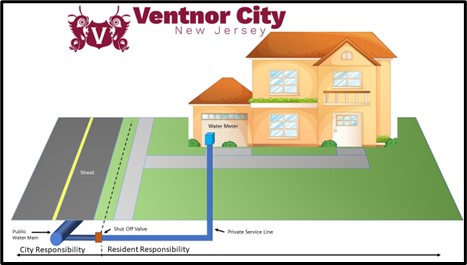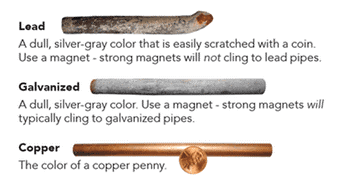Introduction
In July 2021, the State of New Jersey Legislature enacted legislation that requires all water utilities in the State to replace entire lead or galvanized steel service lines in the communities they serve. General Assembly of the State of New Jersey: Chapter 183, Title 58. The replacements must be completed by 2031 and will serve to decrease the public health exposure of lead in drinking water.
Why is Lead an Issue
Most lead exposure comes from contaminated soil, dust or paint chips. However, it is found in drinking water when it comes into contact with lead pipes, such as water service lines or indoor plumbing materials or water fixtures. Exposure to high levels of lead is a serious health risk. Lead builds up in the human body over many years and can cause damage to the brain, red blood cells, and kidneys. Lead exposure can harm children’s brain development, contribute to lower IQ as well as learning and behavioral issues.
How does Lead get into Drinking Water
Like many other water systems in New Jersey, Ventnor Water system has older homes and buildings that may have lead or galvanized steel service lines. The service line are small buried pipes that bring water from the water main in the street to buildings. As water travels through the service line, the corrosion of the pipe can add lead into the treated water delivered to customers. The City of Ventnor water sources and water distribution system is lead free. Therefore, the existing lead or galvanized service lines, lead solder in indoor plumbing, and lead in some older plumbing fixtures are the causes of lead in the drinking water.

Ownership of the water service line varies by water system, but in Ventnor, the service line is owned by the property to curb, delineated by a curb stop. The portion of the service line from the curb stop to the water main is owned by the City of Ventnor. The City of Ventnor plans to replace all Steel Galvanized and Lead Service Lines by the end of 2031.
Click here to see the impacted addresses that will receive replacements
What Materials are Used for Water Service Line Construction

The City of Ventnor Water Department has been working on reducing lead to the customers faucet. To date, the following actions have been taken:
- The water source groundwater is routinely checked annually for lead. All samples to date have been lead free.
- The water is tested once every three years at least 30 high risk homes in the water system. The test results indicate that the water system is in compliance with state and federal regulations meeting the lead and copper action levels as per the Lead and Copper Rule.
Why Lead Service Line Replacement is Important?
A community water system with effective corrosion control and low lead drinking water levels can still have unpredictable exposure of lead. A steel galvanized line or lead service line may contribute small amounts of lead into the drinking water or become trapped in the faucet aerator screen and release lead over time. The removal of an old steel galvanized or lead service line will greatly reduce the potential exposure to lead in Drinking Water.
How Can High Lead Levels be Avoided?
Water can be flushed from your water service line to avoid high levels. If your water has not been used for 6 hours, run the faucet used for drinking and cooking for about 3 minutes before using it for drinking or cooking. Flushing removes stagnant water from the water service drawing in water from the watermain that contains no lead.
How will Galvanized Steel and Lead Service Lines be Replaced
The City of Ventnor will work with homeowners to confirm the presence of a galvanized steel or lead service line.
- The city has identified 5000 plus units identified to be constructed prior to 1989 and identify that a new water service was installed, and the type of material that was used for installation.
- The city has projected 10 phases encompassing the entire island indicating the street, building address and location of the water meter.
- New service lines will be replaced from the water main to the foundation of the property.
- The property will be repaired to a pre-construction condition, post service line installation.
What should I Do After My Water Service Line Is Replaced
The disruption to your water service to remove and replace your galvanized or lead water service can temporarily affect the water quality.
After an initial flush of the replaced water service line is completed by the contractor, remove the faucet aerators from all cold water taps in the residence and fully open the water taps throughout the home for 10 minutes, starting at the lowest level of the residence. Be sure to include bathtubs and showers.
Commonly Asked Questions
Is my water service line in need of replacement?
Older homes in Ventnor up until 1980 could potently have a steel galvanized line which could leach lead into the drinking water. If you have a concern, call Public Works Lead Line at (609)823-7935.
Does the Drinking Water delivered to my home contain lead?
Ventnor’s drinking water does not have lead in it when it is delivered to a resident’s home or business in town. The water meets State and Federal drinking water standards for lead. If you have a concern, call Public Works Lead Line at (609) 823-7935
How long does it take to replace a water service?
Replacement of a water service will normally take several hours. Restoration of property, such as grass, sidewalks, payment will depend on the materials needing repair, existing conditions and weather.
Will my water be turned-off during the replacement?
Yes, your water service will be off for several hours during replacement. Water service will be restored after replacement is complete. Water Service may be interrupted if neighboring water services on your street are being replaced. You will be notified prior to your water service being turned-off.
Should I boil my water after my water service is replaced?
No, boiling water will not reduce lead. Only drink and cook with Cold Water and never use hot water to make food or baby formula.
Have Concerns?
Call Public Works, (609) 823-7935
Information on Lead and Water Services
https://www.nj.gov/dep/lead/notices.html
https://en.wikipedia.org/wiki/Lead_service_line
